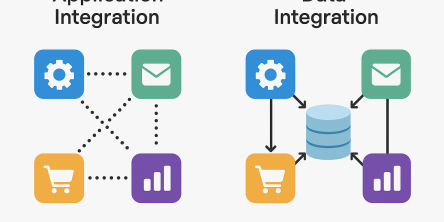Enterprise Mobile Apps: Build In-House or Outsource
With 98% of Fortune 500 companies having already adopted enterprise mobile apps and an additional 70 percent of companies that are investing in building mobility solutions according to a CompTIA study, mobile apps in the business world are poised to emulate the same explosive growth they have recently seen in the consumer technology market. However, mobile application development requires a significant investment of time, expertise, and resources and as a result, the decision as to whether to outsource enterprise mobile app development or build it in-house should be tailored to the individual needs and capacities of the company in question. Both approaches have significant advantages and disadvantages that companies should take into consideration when deciding which app development solution is best for them.
Advantages of In-house Mobile Application Development
Long-term Rewards - In-house app developers are individuals who have chosen to work for your company full-time and as a result, it is likely that they genuinely believe in your idea and will commit their time and labour to it accordingly. Because their incentive rests in growing the company and generating revenue for it, rather than merely securing a client or completing a project on time, in-house app developers seek to generate long-term value for you and your company.
Greater Control - With in-house app developers, you have a greater degree of direct control over their work and the direction you want it to go. Unlike outsourced mobile app companies, the entire app development process is transparent and works according to your needs, capabilities, and schedule. You have complete control over who you want developing your application and can allocate as many resources to mobile app development as you see fit. Lastly, in-house app development guarantees complete ownership and control over intellectual property.
Easier App Specialization - Enterprise mobile applications are used internally by organizations to increase productivity, facilitate collaboration, and improve business processes and workflows. In-house application development better achieves these goals because in-house app developers already have industry-specific and company-specific expertise that allows them to develop apps that are tailored to the needs of their organization.
Disadvantages of In-house Mobile Application Development
Cost - In-house developers, particularly if they need to be hired from scratch or re-trained, can be incredibly cost-prohibitive. Depending on the complexity of the enterprise app you are seeking to build, the salaries you may have to pay to the developers may outweigh the benefits of the app they are developing.
Time - Building and training a skilled, reliable and professional in-house app development team can be incredibly time-consuming. Considering that market demand is high, mobile app developers have no shortage of employment opportunities. This may lead to high employee turnover, which will undoubtedly lead to an inefficient and ineffective app development team.
Maintenance Issues - If you choose an in-house development option, you will have to undertake constant app maintenance and upgrades, which can cost a significant amount of time, resources, and expertise when compared to outsourcing the maintenance process. Additionally, adding new features for your enterprise application, such as integration with other business applications (i.e. ERP systems), is often more affordable when outsourced as third-party developers can leverage their prior experience and expertise to improve your enterprise app.
Advantages of Outsourced Mobile Application Development
Cost-Effectiveness - As previously mentioned, assembling and training a mobile development team can be expensive. When you outsource mobile app development, you outsource the need to find, train, and hire mobile developers and can save a significant amount of resources and capital that could otherwise be put to a more productive use. Additionally, third-party app developers will typically charge a fixed price for app development that reduces the risk and cost variability as well.
Time to Market - Outsourcing the entire process of finding, training, and hiring competent app developers means that these third-party developers can turn your ideas into ready-for-sale products much faster than in-house application developers can. Outsourced mobile app development firms have tools and components that expedite the app development process.
Expertise - Third-party application development firms typically have a repository of app development experience; have the necessary tools, resources, and expertise to build comprehensive, functional apps. Additionally, outsourced app development companies have highly specialized application development teams, where developers can focus on different aspects of your app according to their individual areas of expertise.
Disadvantages of Outsourced Mobile Application Development
Loss of Control: Outsourcing mobile app development entails a significant loss of control over how resources are prioritized. No amount of detailed explanation to a third-party can compete with having direct control over a team of in-house developers. Additionally, depending on contractual arrangements, outsourcing your mobile app development may involve ceding ownership rights over intellectual property.
Loss of Flexibility - In-house app development teams are nimble and can implement small changes and improvements on an ad-hoc basis. Because the lines of communication are less open and effective to outsourced mobile app development firms, otherwise minor changes could be expensive or time-consuming to complete.
Risk - Third-party mobile app development firms vary hugely in quality of service and levels of professionalism. Thus, outsourcing your mobile app development necessitates a degree of risk, as the possibility of selecting an inexperienced or incompatible firm always exists.
Thus, both outsourced and in-house app development solutions have inherent advantages and disadvantages. Enterprise apps are designed to facilitate the operations of a company and are business-specific and as a result, the decision as to which should be used is particular to each individual organization and the application it is trying to develop. If an application is relatively simple, or similar apps already exist, assembling an in-house mobile app development team makes little sense. Ultimately, the decision to use an in-house or outsourced application development solution is a function of a company’s schedule, budget, and willingness to cede control. Companies that are seeking to build highly specialized apps that will require significant amounts of maintenance and future time investment and are capable of dedicating significant resources are generally better off using in-house app development solutions. Contrarily, firms that are on a tighter budget and have more restrictive time constraints should generally outsource their mobile application development needs.
For many companies, a hybrid approach that combines in-house software development with outsourced app development solutions may be an optimal approach. Companies that have skilled development teams that lack the size and scale to build or maintain a particular product may consider outsourcing specific components of the app development process rather than expanding their in-house app development team. Often, in-house app development teams are fully capable of app maintenance but may occasionally require additional help, in which case hiring outsourced mobile app development firms on an ad-hoc basis makes sense.
Similar Articles
Discover the best tools to enhance employee recognition, boost morale, and create a more motivated, engaged workplace culture.
At first glance, off-the-shelf software appears to be a dream come true. They are quick to set up, cheaper upfront, and marketed as “universal.”
A modern business must continually adapt. This bit everyone seems to know.
The modern healthcare industry is undergoing a significant transformation. The models of healthcare that we are used to thus far are now making way for a more data driven approach
In the modern world, maintaining good health often feels like a constant challenge. Between busy lifestyles, sedentary habits, and lack of motivation, many people find it difficult to stay consistent with exercise, diet, or wellness practices.
Every news publisher's dream, or just getting started, hits that wall sooner or later. What do you build your site on? You’ve basically got two roads: WordPress or custom development.
Discover key features construction teams need in permit tracking software to boost efficiency, stay compliant, and streamline project management.
Thanks to cloud computing, specialized SaaS apps have become rather accessible.
Let’s be honest – managing royalties isn’t exactly the fun part of working in media or publishing, but it is very important because it protects the creator’s rights and work ownership.








